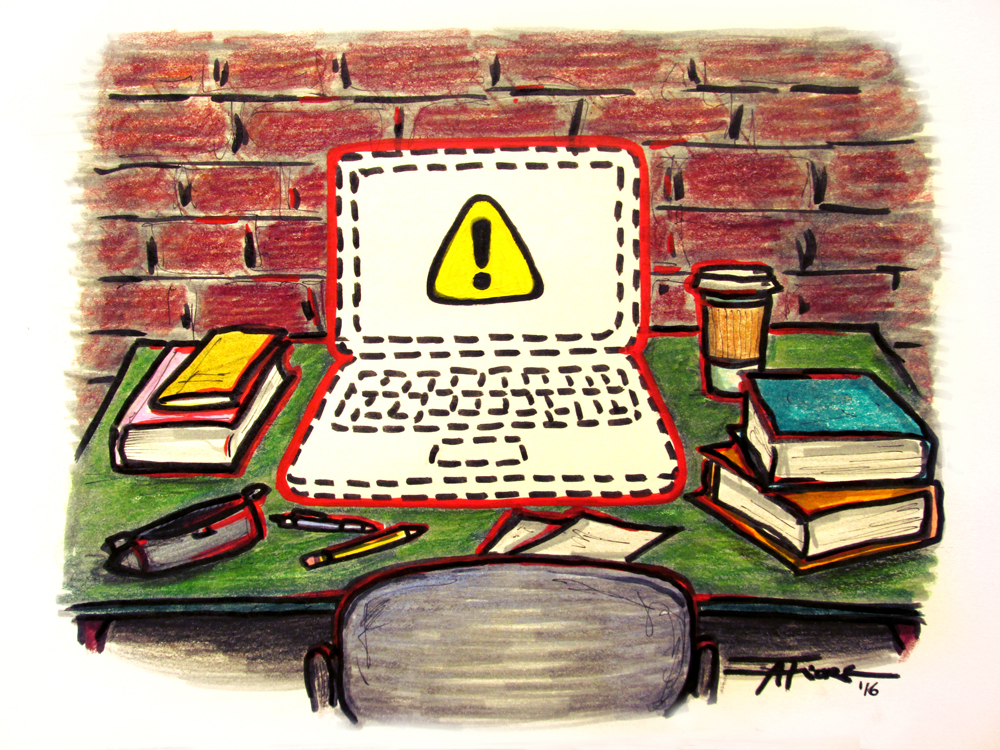Upon entering the typical McGill classroom, a sea of screens makes it clear that the use of laptops and tablets for note-taking has become commonplace. In response to this phenomenon, professors tend to clarify their technology policy during their first lecture of the semester: Even if they permit the use of laptops and tablets for note-taking, many will point to research that proves the damaging effects of technology use in the classroom, though these remarks are often ignored. In most cases, students should be trying to make the switch to handwritten notes, using technology to enhance their academic experience as opposed to letting it infiltrate every part of it.
Almost universally, students get their course material on MyCourses, McGill’s ‘online classroom.’ Considering this, it seems logical and convenient to bring online tools into the physical classroom, too. Typing is generally faster than writing by hand, and software like Microsoft OneNote allows students to enhance study materials while providing the freedom to edit notes after lectures. Additionally, having access to search engines can help students avoid falling behind if a term or concept discussed is unclear, especially if the class is too large to ask questions. These factors alone might lead one to the conclusion that typing notes makes the most sense for the average student.
However, in the long run, this convenience comes at a cost and can lead to poorer grades. Research from the University of California, Los Angeles has shown that those who write by hand tend to be more selective with what they take down in their notes instead of rushing to copy down everything verbatim when typing. While those who type notes can recall dates and facts at the same level as those who write by hand, more nuanced arguments tend to be absorbed better when students use a paper and pen.
Students have also become increasingly compulsive users of social media, with the average person checking their phone every 12 minutes. This is no accident; social media platforms are engineered to keep users addicted. This may explain why checking social media on a laptop is so appealing during lectures. Some students avoid this through self-discipline or applications that block specific websites, but most can be switched off relatively easily.
As time goes on, these distractions make it harder to concentrate for extended periods of time. A study conducted earlier this year compiled years of research on the subject, coming to a near-definite conclusion that certain brain functions, including levels of concentration and capacity for the retention of information, are negatively impacted by constant technology use. These effects can take a toll on students’ ability to be productive and actually absorb what is taught in lectures, which makes doing well more difficult.
It is important to recognize that technology in the context of the classroom can be beneficial. Typing can make learning much easier for people with learning disabilities, as can text-to-speech software. There is also no doubt that greater access to information and the ability to use online databases and library material makes research easier. Further, online in-class quizzes can encourage students in large classes to attend lectures and catch up on readings, and recorded lectures can be crucial for those who need to miss class. However, the existence of these benefits does not mean that every aspect of students’ academic experiences should be digitized.
Technology in and of itself is not all bad; its positive impact on things like research, medicine, and communication should not be understated. The problems begin when these benefits lead to a belief that everything we do needs to be improved or made more convenient through digitization. Note-taking by hand is more than sufficient for the average person and can lead to better grades and long-term cognitive benefits. Those unhappy with their academic performance should consider eliminating unnecessary technology use. Though this may not make a difference for everyone, science says it’s worth a try.








